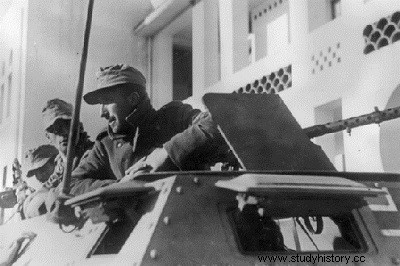
On November 30, the English launched a regular attack, with artillery support, against the "green" (commando No. 6 in brigade reserve), and against the "bald" (Royal West Kent). The “Buffs” (a nickname for the regiment) had been ordered to hold on all around the position and then exploit their advantage. It was a failure.
The commandos infiltrated under the cover of the maquis of the "green hill" ended up achieving their objectives and holding them all day in a succession of skirmishes. But the West Kents learned at their expense a good lesson in the tactics of defending a counter-slope, as the Germans intended. When the men emerged onto the long, open ridges of the "bald hill", they were cut down by the crossfire of well-camouflaged Spandau machine-gun nests. At the same time, the English artillery observation posts and their means of radio transmission were being crushed under the shells.
After a last fight, superb in bravery and relentlessness, reason prevailed to stop this attack and withdraw the survivors. The affair had cost the 36th Brigade 11 more officers and 150 men. The access road to Tunis from the north was, this time, well cut off by the Germans.
The same almost happened for the southern route, control of which was temporarily taken over by the Germans. Axis forces. The key objective of the Allies on this route was the small town of Medjaz-el-Bab (Bab means door in Arabic), crossing point of the road to Tunis on the Medjerda, a wide but almost dry river. The English attack was a failure. A night action on both banks was to be carried out jointly from the west by the 2nd Battalion of the Lancashire Fusiliers, and by the 5th Battalion of the Northamptonshire Regiment which would attack on the German rear from the east after having crossed the river upstream and made a turning movement.
Everything went very badly. At dawn on 25 November, the Northamptonshires ran into an armored formation and were driven back, while the German outposts managed to hold off the riflemen long enough—the battalion commander was killed in the process—to force them to crossing the Medjerda in broad daylight with the sun in their eyes.
Three companies attempted to cross the river in chest-deep water, the men holding their weapons above their head, and storm the 6-meter escarpment from the opposite bank. They were met with heavy machine-gun fire and the position quickly became untenable, with no support from the Northamptonshires. And a stall in broad daylight would have been a very dangerous operation...
Luckily, an artillery officer, Captain George Barker-Benfield had also crossed the river, with his transmitter- radio receiver on the shoulders. He succeeded in triggering a barrage of fire from the 24 guns of the 132nd Territorial Field Artillery Regiment, of the Welsh, to cover the orderly retreat of the Fusiliers. Back in their starting position, the English watched helplessly as the demolition charges placed by the German sappers exploded.
